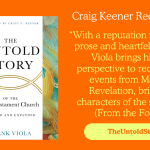Every spring, basketball takes over my life for several weeks. I still function: I continue to do those things I tell my kids constitutes my “work.” I eat, sleep, talk, teach, write. But for a few weeks baseketball is my life. A Brazilian friend went through something similar recently – something about another game that uses a round ball, a net, and requires quick footwork. If you asked me, even during an NBA finals game, “Is basketball really that important,”... Read more














